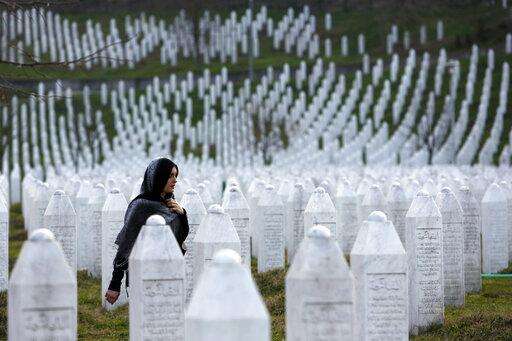FILE - In this Aug. 25, 1992 file photo, Radovan Karadzic, Bosnian Serb leader in Bosnia-Herzegovina, indicates the Serb territories in Yugoslavia during a news conference in London. Nearly a quarter of a century since Bosniaâs devastating war ended, former Bosnian Serb leader Radovan Karadzic is set to hear the final judgment on whether he can be held criminally responsible for unleashing a wave of murder and destruction during Europeâs bloodiest carnage since World War II. United Nations appeals judges on Wednesday March 20, 2019, will decide whether to uphold or overturn Karadzicâs 2016 convictions for genocide, crimes against humanity and war crimes and his 40-year sentence. (AP Photo/Denis Paquin, File)
The Associated Press
THE HAGUE, Netherlands (AP) - The Latest on a U.N. court's decision on the conviction and sentencing of ex-Bosnian Serb leader Radovan Karadzic (all times local):
2:50 p.m.
Dozens of survivors and relatives of the victims from Bosnia's 1992-95 war have gathered to watch the broadcast of the final ruling at a U.N. court in the genocide and war crimes case against former Bosnian Serb leader Radovan Karadzic.
A screen has been set up in the memorial center in Srebrenica, where Bosnian Serb troops killed some 8,000 Muslim men and boys in 1995, in what international courts say was genocide.
Karadzic has appealed his 2016 conviction on genocide charges and a 40-year prison sentence, and judges of the Yugoslav war crimes court are delivering their ruling on his appeal on Wednesday. The judges are also set to rule on whether Karadzic should have been acquitted of a second count of genocide.
Survivors and Bosnian citizens have also gathered in the capital, Sarajevo, to watch the delayed broadcast from the Netherlands.
The ruling is considered key for delivering justice in Bosnia.
___
2:10 p.m.
A hearing is underway at a United Nations court where judges will hand down their decisions in the appeal by former Bosnian Serb leader Radovan Karadzic against his convictions and 40-year sentence for masterminding atrocities in his country's devastating 1992-95 war.
Karadzic appealed his 2016 convictions for genocide, crimes against humanity and war crimes, as well as his sentence. The judges are also set to rule on whether Karadzic should have been acquitted of a second count of genocide.
Karadzic, wearing a dark suit and red tie, was led into court by U.N. guards, before confirming to the presiding judge that he could follow the proceedings in a language he understood at the start of the hearing at the International Residual Mechanism for Criminal Tribunals.
___
11 a.m.
United Nations judges are set to hand down their decisions in the appeal by former Bosnian Serb leader Radovan Karadzic against his convictions and 40-year sentence for masterminding atrocities in his country's devastating 1992-95 war.
Karadzic appealed his 2016 convictions for genocide, crimes against humanity and war crimes, as well as his sentence. Prosecutors appealed his acquittal on a second count of genocide during Europe's bloodiest conflict since World War II.
Relatives of victims of the war gathered outside the courtroom Wednesday ahead of the hearing that will announce the decisions.
Karadzic is one of the most senior figures tried by the Hague war crimes court. His case is considered as key in delivering justice for the victims of the conflict, which left over 100,000 people dead and millions homeless.

FILE - In this Thursday July 31, 2008 file photo, former Bosnian Serb leader Radovan Karadzic stands in the courtroom during his initial appearance at the U.N.'s Yugoslav war crimes tribunal in The Hague, Netherlands. Nearly a quarter of a century since Bosniaâs devastating war ended, former Bosnian Serb leader Radovan Karadzic is set to hear the final judgment on whether he can be held criminally responsible for unleashing a wave of murder and destruction during Europeâs bloodiest carnage since World War II. United Nations appeals judges on Wednesday March 20, 2019, will decide whether to uphold or overturn Karadzicâs 2016 convictions for genocide, crimes against humanity and war crimes and his 40-year sentence. (Jerry Lampen/Pool via AP, File)
The Associated Press

FILE - In this Sept. 23, 1992 file photo, Bosnian Serb leader Radovan Karadzic holds a knife he said was seized from Bosnian Croat soldiers in Bosnia during a news conference in Belgrade, Yugoslavia. Nearly a quarter of a century since Bosniaâs devastating war ended, former Bosnian Serb leader Radovan Karadzic is set to hear the final judgment on whether he can be held criminally responsible for unleashing a wave of murder and destruction during Europeâs bloodiest carnage since World War II. United Nations appeals judges on Wednesday March 20, 2019, will decide whether to uphold or overturn Karadzicâs 2016 convictions for genocide, crimes against humanity and war crimes and his 40-year sentence. (AP Photo/File)
The Associated Press

FILE - A July 13, 1995 file photo shows refugees from the overrun U.N. safe haven enclave of Srebrenica looking through the razor-wire at newly arriving refugees, in a UN base 12 kms south of Tuzla, 100kms (60 miles) north of Sarajevo. Nearly a quarter of a century since Bosniaâs devastating war ended, former Bosnian Serb leader Radovan Karadzic is set to hear the final judgment on whether he can be held criminally responsible for unleashing a wave of murder and destruction during Europeâs bloodiest carnage since World War II. United Nations appeals judges on Wednesday March 20, 2019, will decide whether to uphold or overturn Karadzicâs 2016 convictions for genocide, crimes against humanity and war crimes and his 40-year sentence. (AP Photo/Darko Bandic, File)
The Associated Press

FILE - In this Sept. 18, 1996 file photo, International War Crimes Tribunal investigators clear away soil and debris from dozens of Srebrenica victims buried in a mass grave near the village of Pilica, north east of Tuzla, Boisnia-Herzegovina. Nearly a quarter of a century since Bosniaâs devastating war ended, former Bosnian Serb leader Radovan Karadzic is set to hear the final judgment on whether he can be held criminally responsible for unleashing a wave of murder and destruction during Europeâs bloodiest carnage since World War II. United Nations appeals judges on Wednesday March 20, 2019, will decide whether to uphold or overturn Karadzicâs 2016 convictions for genocide, crimes against humanity and war crimes and his 40-year sentence. (AP Photo/Staton R. Winter, File)
The Associated Press

FILE - In this Sunday, March 20, 2016 file photo, a Bosnian woman walks among gravestones at Memorial Centre Potocari near Srebrenica, Bosnia and Herzegovina. Nearly a quarter of a century since Bosniaâs devastating war ended, former Bosnian Serb leader Radovan Karadzic is set to hear the final judgment on whether he can be held criminally responsible for unleashing a wave of murder and destruction during Europeâs bloodiest carnage since World War II. United Nations appeals judges on Wednesday March 20, 2019, will decide whether to uphold or overturn Karadzicâs 2016 convictions for genocide, crimes against humanity and war crimes and his 40-year sentence. (AP Photo/Amel Emric, File)
The Associated Press

FILE - In this Sunday, March 20, 2016 file photo, a Bosnian woman walks among gravestones at Memorial Centre Potocari near Srebrenica, Bosnia and Herzegovina. Nearly a quarter of a century since Bosniaâs devastating war ended, former Bosnian Serb leader Radovan Karadzic is set to hear the final judgment on whether he can be held criminally responsible for unleashing a wave of murder and destruction during Europeâs bloodiest carnage since World War II. United Nations appeals judges on Wednesday March 20, 2019, will decide whether to uphold or overturn Karadzicâs 2016 convictions for genocide, crimes against humanity and war crimes and his 40-year sentence. (AP Photo/Amel Emric, File)
The Associated Press